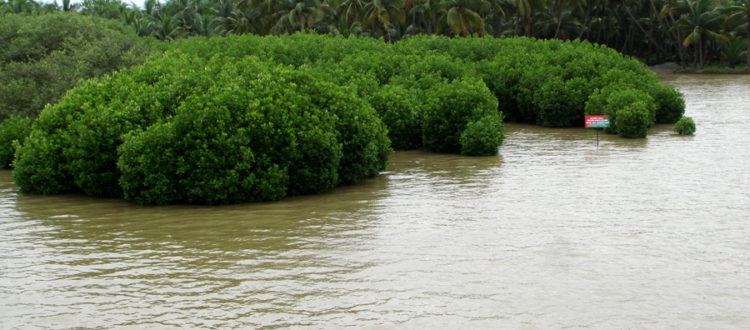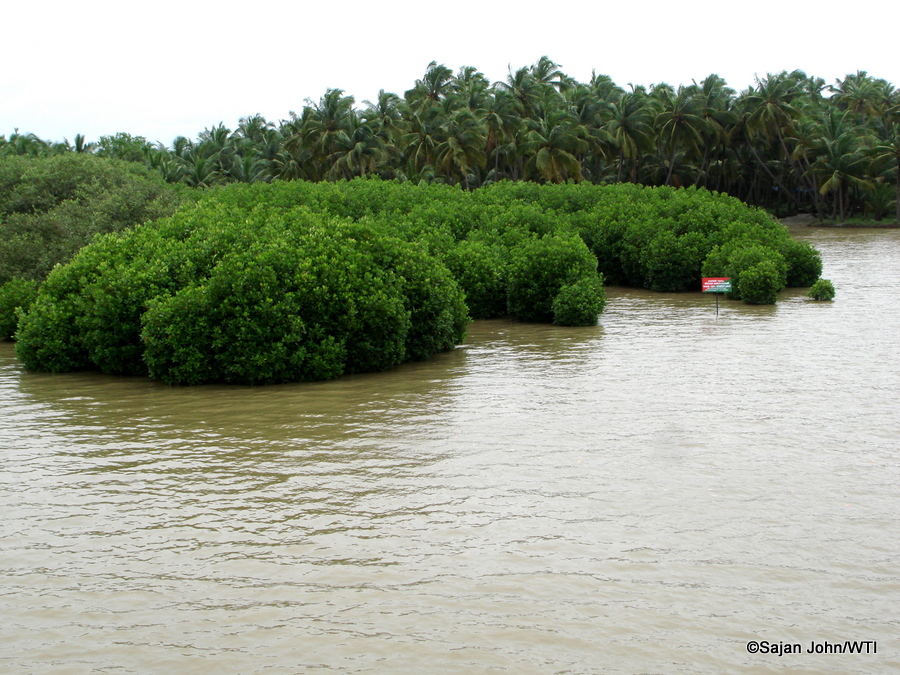WTI Launches Mangrove Restoration Project in Kerala
The Kannur Kandal Project – ‘kandal’ being the Malayalam word for mangroves – aims to ensure the survival of existing mangroves and increase the acreage of such habitats across Kannur, potentially making it a prototype for other coastal districts in Kerala and the rest of the country.
Mangrove forests are unique ecosystems, extremely rich in biodiversity, growing along inter-tidal coastal habitats such as shorelines, estuaries and backwaters. They are both refuges and nurseries for a large variety of threatened terrestrial and aquatic species, and an important source of fodder, medicines and firewood for people living in coastal communities. They also act as barriers against cyclones and tsunamis (evidenced in their important role in reducing the impact of the 2004 Indian Ocean tsunami), prevent coastal erosion, and maintain inland water quality by preventing sea water intrusion.
However, mangrove forests have faced considerable destruction the world over, with less than half of the original acreage remaining. About half of that loss has occurred in the last 50 years, and a significant amount in just the last two decades, especially due to human population growth and intrusive development. (Data from Global Forest Watch, an online forest monitoring platform, shows that the world lost 192,000 hectares of mangroves between 2001 and 2012.)
The acreage of mangroves in Kerala has also reduced drastically over the years, with only 1750 hectares of an estimated historical 70,000 hectares remaining. Conversion into coconut plantations or other agricultural land, aquaculture, unscientific water regulation, population pressures, real estate development, inadequate enforcement of laws, etc have all contributed towards mangrove destruction.
The WTI-Apollo Tyres project will be based in Kunhimangalam village, which is one of the largest mangrove villages of Kerala. Land secured with the support of the international NGO World Land Trust will be used to establish a hub, located in the natural ecosystem, for mangrove-based research and education, and the promotion of mangrove restoration through community and government participation. A mangrove nursery will be established and community-based initiatives launched to enhance public awareness and reduce threats to mangroves. Special efforts will be made to generate scientific interest about mangroves among the youth.
“The abuse and decline of our mangrove forests should be of particular concern to all of us”, said WTI’s Executive Director & CEO Vivek Menon, “primarily for the loss of their marvellous biodiversity, but also for their value as a natural buffer against climate change and its attendant adverse effects. I am extremely pleased, therefore, that we at the Wildlife Trust of India have partnered with Apollo Tyres to launch the Kannur Kandal Project. This is a crucial first step towards the securing and restoration of our mangrove forests; I trust that as the project unfolds it will serve as a model for Kerala and subsequently, the rest of coastal India.”
Satish Sharma, Apollo Tyres Ltd’s President for Asia Pacific, Middle East & Africa said, “Biodiversity conservation is an important thrust area within our Environmental Sustainability initiative – HabitAt Apollo. We are happy to partner with Wildlife Trust of India on mangrove conservation, a project that has huge ecological significance. This association reflects our commitment towards bringing conservation issues to the forefront, raising awareness and creating positive impact.”










